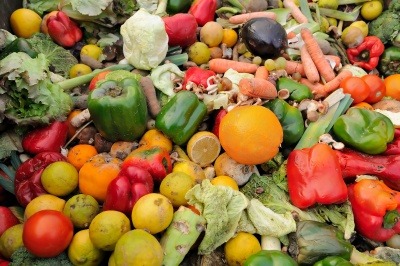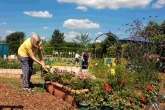‘Compost revolution’ needed to avert looming food waste crisis
Enrich the Earth, a new coalition movement of diverse organisations including the National Trust, Royal Horticultural Society (RHS), Suez and the Horticultural Trade Association, today (14 September) launched a manifesto calling for an urgent ‘compost revolution’ to galvanise the public and achieve two goals around organic waste.
 The movement – which features leading experts including horticulturists, academics, retailers, trade associations and charities – is today calling for a radical rethink of how we handle organic waste in the UK. Its goals are:
The movement – which features leading experts including horticulturists, academics, retailers, trade associations and charities – is today calling for a radical rethink of how we handle organic waste in the UK. Its goals are:
- To increase the proportion of households composting at home from 33 per cent to 50 per cent – this would prevent 1,000,000 tonnes of waste needing to be processed by local authorities each year;
- To decrease levels of contamination in UK gardens and food waste bins – this is reaching 20 per cent in some areas and significantly reduces the potential of the material to be used on farms and in people’s gardens. The UK organics recycling sector spends around £50 million on the removal and disposal of over 350,000 tonnes of plastic.
UK households produce 14 million tonnes of food and green waste every year. An estimated two million more tonnes will need to be processed by local authorities when the anticipated mandatory food waste collections start in 2024. Experts warn that the country is facing a crisis unless urgent action is taken.
Enrich the Earth was brought together by a new environmental innovator, Sizzle. Founder of Sizzle, Trewin Restorick, said: “The introduction of mandatory food collections is welcome but it’s a waste of time if there is no clear plan from government as to what will happen with the waste collected.
“Radical systemic change is needed and so is a focus on making better use of our waste at home. Composting our grass and hedge clippings and fruit and veg scraps is a great place to start and it’s an immediate step we can all take to fight climate change and enrich our soil.
“According to [a] 2021 Census [by Censuswide], almost nine in ten people have access to a garden in the UK but our polling suggests only a third of us make our own compost, so we believe there is a huge opportunity here. We’re especially keen for ‘reluctant’ composters to have a go for the first time – it’s surprisingly easy, you get nutrient-rich gold for your garden and it’s free!”
Issues that could lead to food waste crisis
The document identifies several issues that need addressing to avert the looming crisis. Firstly, the UK currently doesn’t have enough facilities in the right places – i.e. close to the source – to process this material. Food waste is heavy and of low value and transporting it long distances is costly and has a high environmental impact. Massive investment is needed to build anaerobic digesters across the country, but this won’t happen until the right legislation is passed which will take time, with no clear plans from the government as to what will happen in the meantime.
The coalition is also urging the sector to find sustainable alternatives to the 965,000 cubic meters of peat used in horticulture every year. Organic waste might be able to replace up to 30 per cent of the peat used – however, this is only possible if contamination is reduced.
Without urgently addressing contamination levels there is a risk the incoming extra two million tonnes of food waste collected is worthless and an environmental burden rather than a useful asset in this process.
Dr Adam Read, Chief External Affairs and Sustainability Officer at SUEZ Recycling and Recovery UK, said: “It’s essential that we see a rapid reduction in the levels of contamination in food and green waste so the compost we make is of better quality and therefore more usable.
“Organic waste is really valuable when not contaminated with other materials and can be used to enrich the soil on our farms and in our gardens. We're urging the public to be conscientious when throwing things away and check what can and can’t go in their food and green waste bins.
“It’s common for us to see items such as plastic bottle caps, plastic wrappers and bags but we’ve also seen Christmas decorations, garden gnomes, chairs, buckets and even lawnmowers! Households can play their part by making sure only organic materials go into their garden and food waste – progress only happens when we all do our bit and everyone has a part to play in creating real lasting change for the future of our planet.”
North East trial to maximise value of green waste compost
A new trial also launches today (14 September) in the North East to maximise the value of compost from green waste collected from households across the region. It is the first of its kind at this scale.
Garden centres, community gardening groups, restaurants and universities will put in a concerted effort to compost garden waste and non-animal byproduct food scraps more, use wormeries and reduce contamination in organic waste collections. Learnings will be openly shared with the aim of rolling out the trial across the country.
The coalition hopes that the learnings from the North East trial will help highlight what new steps are needed and demonstrate what is feasible and beneficial when it comes to using organic waste as a replacement for peat.

“The Royal Horticultural Society is already 98 per cent peat-free and aims to be 100 per cent peat-free, including propagation, retail and shows by the end of 2025. The RHS composts all its green waste and uses it to make its gardens bloom.
“Composting is a great way to empower gardeners to take climate-positive actions to help tackle the climate crisis. If every gardener gets composting, they will free up key peat-free materials (bark, coir and wood fibre) for the horticulture industry. This in turn helps industry to accelerate their transition to peat-free so our nation can grow and enjoy healthy peat-free plants.”
Enrich the Earth composting movement
Enrich the Earth aims to get the highest value from green and unavoidable food waste to cut carbon emissions, build a circular economy and reduce costs. It is currently independently funded by the Esmée Fairbairn Foundation.
Other member organisations include the National Trust, RHS, Suez, the Horticultural Trade Association, NIAB, ADAS, Chris Baines Associates, Carbon Clarity, Garden Organic, REA, Caledonian Horticulture, Our Natural World, Garden Centre Association, Growing Media Association, CIWM, Southern Trident and SJB Quality Consulting Ltd.
Its creator – the new Community Interest Company Sizzle – was founded by Trewin Restorick following his departure as CEO of the environmental charity Hubbub.
Sizzle’s ambition is to rethink the way that products and services are delivered to reduce environmental impact whilst being affordable, high quality and financially viable.









